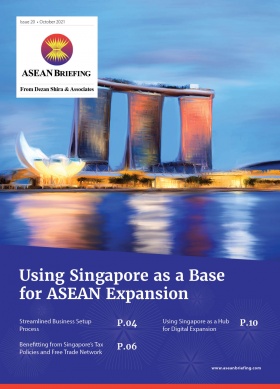Vietnam Amends Rules on Labeling Goods, in Effect from Feb.15, 2022
On December 9, 2021, Vietnam issued Decree No. 111/2021/ND-CP (Decree 111/2021), which amends the rules on labeling of goods.
Decree 111/2021 aims to tackle tax evasion and fraud, and mandates individuals and organizations that produce, export, or import goods to record and determine the origin of their goods. Their labels must ensure accuracy, truthfulness, and compliance with legal provisions on the origin of goods imported to, exported from, and manufactured in Vietnam, or any country participating in international agreements with Vietnam.
Decree 111/2021 amends Decree No. 43/2017/NĐ-CP (Decree 43/2017) on product labeling regulation and will come into effect on February 15, 2022.
What are the amendments under Decree 111?
Mandatory information on labels for imported goods to Vietnam
Decree 111/2021 mandates that goods imported into Vietnam must have their original labels that indicate either in a foreign language or Vietnamese the following information:
- The name of the goods;
- The origin of goods;
- Name or abbreviated name; and
- Address of the foreign manufacturer or foreign company responsible for importing the goods.
The origin of goods
Decree 43/2017 made it obligatory to display the origin of goods on labels without other alternatives. This caused difficulty for businesses that could not determine the origin of their goods. Decree 111/2021 modifies this by adding a clause whereby if the origin of goods could not be determined, the business can state the place where the final production stage was conducted.
The following statements or phrases should be presented together with the country or territory where the final production stage took place:
- ‘Assembled in’;
- ‘Bottled in’;
- ‘Product of’;
- ‘Made in’;
- ‘Mixed at’;
- ‘Packed in’;
- ‘Manufactured in’; or
- ‘Labeled at’, among others.
The decree also forbids abbreviating the country where the goods were completed or manufactured.
What about exported goods?
The scope of regulations for the labeling of goods was restricted to goods imported and circulated in Vietnam, according to Decree 43/2017. Decree 111/2021 has expanded this scope to include exported goods.
Goods labeled for export must comply with the regulations of the importing country. The origin of goods labels must comply with Vietnamese regulations or with the international agreements that Vietnam is a signatory to.
Further, the label must not contain images or content regarding sovereign disputes or sensitive content that could impact Vietnam’s national security, society, economics, customs, and diplomatic relations.
Medical device labeling
Imported medical devices into Vietnam, the labels must show:
- The name and address of the legal manufacturer; and
- The name and address of the company or individual who is the registrant (registration number).
If the medical device does not have a registration number, the name and address of the company or individual on the import license, as well as the name and address of the owner of the medical device must be written on the label.
The label must also be written in Vietnamese. If this is unavailable, then a supplementary label in Vietnamese must be added, while the original label remains unchanged.
Transition period
In scenarios where a) goods labels are compliant with Decree 43/2017 and b) the products were manufactured, imported, or circulated before February 15, 2022 – businesses can continue to circulate them until the product’s expiry date.
Further Reading
- A Step by Step Guide to Import and Export Procedures in Vietnam
- Scotland Eager to Support Offshore Wind Power Projects in Vietnam
- Vietnam to Increase Production of Russia’s Sputnik V Vaccine
About Us
ASEAN Briefing is produced by Dezan Shira & Associates. The firm assists foreign investors throughout Asia and maintains offices throughout ASEAN, including in Singapore, Hanoi, Ho Chi Minh City, and Da Nang in Vietnam, Munich, and Esen in Germany, Boston, and Salt Lake City in the United States, Milan, Conegliano, and Udine in Italy, in addition to Jakarta, and Batam in Indonesia. We also have partner firms in Malaysia, Bangladesh, the Philippines, and Thailand as well as our practices in China and India. Please contact us at asia@dezshira.com or visit our website at www.dezshira.com.








